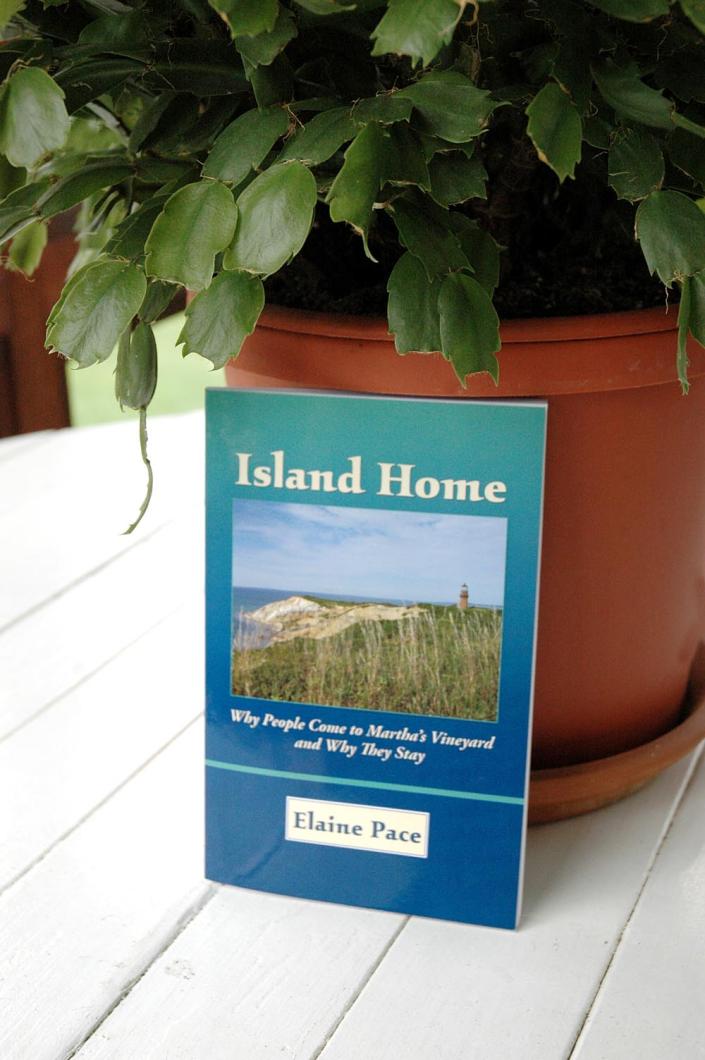Why do some washashores to the Island stay ashore while others drift away?
The question had settled in Island author Elaine Pace’s mind for a couple of years. She spent a year talking with people who stayed and the result is Island Home, the stories of 14 pilgrims who visited, then chose to live on the Vineyard.
Subtitled Why People Come to Martha’s Vineyard and Why They Stay, the self-published book hits Island bookstores today. The book joins Island, a Memoir, Ms. Pace’s first book, published in 2005.
A book launch party for Island Home will be held from 4 to 6 p.m. Sunday at the Paces’ West Tisbury home. Profits from the book launch will be shared with the Island Food Pantry of Martha’s Vineyard.
The storytellers in Ms. Pace’s book are not the rich and famous. Most are workaday people you meet on the street. None of them brought sacks of money with them; many brought none and have hard-scrabbled their way to a permanent home here.
Washashore readers will identify with stories of a commitment to live here that often resembles an endurance contest, testing a decision to live in a specific environment rather than for material opportunity or to get ahead.
To qualify as a permanent washashore, the interviewees in her book had to have lived here permanently for at least six years. Several have been here for more than 30 years.
The subjects include Jim Newman, an Aquinnah selectman, Isaque Silva, a Brazilian truck driver, and Janet Messineo, a 1960s vagabond who had never fished but has transformed herself into a nationally known striped-bass fishing expert.
“Linsey Lee captured the stories of the deep-rooted Islanders in Vineyard Voices. I took the other side, people who have chosen to live here,” said the writing coach, a former New Jersey schoolteacher and administrator, in an interview this week.
Her own story of taking root on the Island, like most of her subjects, was a process that began several decades before she moved to West Tisbury in 2000 as principal of the West Tisbury school. In her case, the move also involved a career change for her husband who left his job in New Jersey, relocated to Boston and commuted weekends to the Island before gratefully and permanently moving here in 2004.
All of the stories, however, prove that the storytellers did get ahead, using or completely reshaping their skills to find a fit in Island life. The author, for example, became a writing coach after a career in education.
Why washashores stay here is found in the answers the 14 subjects gave to the same 20 interview questions.
Part of the reason they stay is a commitment to be a human being rather than a human doing as well as the excitement — and challenge — of reinventing themselves.
Ironically, risk-taking and willingness to endure the rigors of short money, the Vineyard shuffle, summers crowded with visitors and traffic and winters spent eking out the rent money have been the crucibles from which washashores found successful places in the Island community.
“I see a wonderful synergy between Islanders and washashores who bring skills and perspectives to Island life,” Ms. Pace said.
Is the oft-mentioned cultural divide between Islanders and washashores receding or as strong as ever?
“I can’t make a sweeping statement about that but where it exists, I see it exists in generalizations Islander and washashores make,” she said.
A sample of opinions from Ms. Pace’s washashore subjects:
“I want to be an old Vineyard salt . . . We need small and simple and meaningful lives,” environmentalist Suzan Bellincampi said.
“I live in the most magical place in the world, not because of the beaches or the sunsets but because I’ve been free to be myself,” Ms. Messineo said.
“Wanting so much to live on the Vineyard freed me to use a new part of my brain and (to) develop other parts of myself,” said Peter Boak, music minister and teacher.
“Economic survival is a real art for many, yet that’s what I love most about the place. It’s real,” the Rev. Vicky Hanjian said.
“You’re not anonymous here. You matter,” said Elaine Eugster, a history and mathematics scholar and Hospice volunteer.
For selectman Jim Newman, the defining moment came with his realization that Islanders are willing to sustain community while accepting different viewpoints.
“On a winter night after a bitterly fought battle at town hall, a woman who had argued bitterly against my position left the hall in front of me. She turned around when she reached the steps to the outdoors and warned, ‘Be careful, Jim, it’s icy outside.’ That bit of kindness speaks to the spirit of the Island and especially to Aquinnah,” he said.
As a washashore, I read carefully to find my defining moment. I found it in the comment by Kim Lawrence, a land title researcher.
While riding her bike one morning in Edgartown, she said, “I happened upon the most beautiful buck . . . The buck stood looking at me for several minutes, and walked back into the state forest.”
More than 20 years ago, I was hurtling across Wasque Point at dawn to catch the early ferry back to Boston to resolve a business issue. My buck stood at the top of hill by Wasque Point. He seemed to be asking me what I was doing, rushing off from vacation in high anxiety.
I have known for 20 years that he was right. My action was appropriate to the life I was living, but the life I was living was inappropriate to me.
People who wish to attend the Island Home book launch party from 4 to 6 p.m. on Sunday may call 508-696-3796 for directions.






Comments
Comment policy »